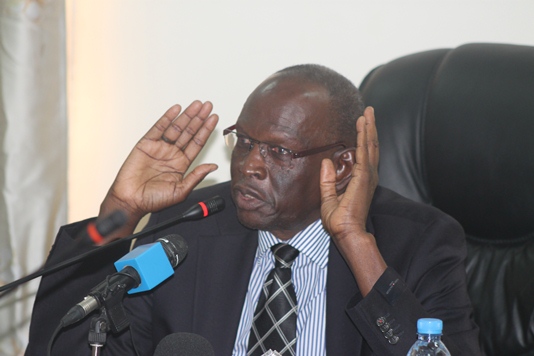S. Sudan Central Bank reserves can last five years: Governor
By Julius N. Uma
September 11, 2012 (JUBA) – South Sudan’s Central Bank has sufficient reserves of local currency, capable of running the country for the next five years without printing any money, Kornelio Koriom, its Governor said Tuesday.

The Governor, who preferred not to disclose how much South Sudan has in reserves, said the Central Bank still has enough money kept in portions within its branches in Malakal (Upper Nile), Wau (Western Bahr el Ghazal) and Yei in Central Equatorial State.
“We are not running out of cash. It is only what has to be circulated within the rules of the Central Bank and controlled by the Finance ministry that can be talked about [but] not what is in the bank,” he told a press conference in Juba, the South Sudan capital.
Koriom likened the government spending in the wake of the current austerity measures, to family expenditures, saying even a father plans for his family in a crisis situation.
“We are still able to operate for the next five years without printing more money,” he told journalists at a briefing held at the bank’s premises.
The Central Bank Governor also described as “careless” and “nonsense” talks that South Sudan’s economy was at the verge of collapse, perhaps in reference to the leaked World Bank report, which Sudan Tribune reported about in June.
“What will make this country’s economy collapse? We have enough resources capable of supporting this economy,” he said.
FUEL CRISIS
The Governor, during the press conference, also blamed the country’s Petroleum and Mining ministry for the current fuel crisis, which hit most parts of the South Sudan capital for nearly two weeks.
The Central Bank, he said, allocated US$40m through “revolving credit” to enable the petroleum ministry to import enough fuel into the country, to avert any crisis resulting from shortages.
“When we asked the petroleum ministry why there was a fuel crisis in the country, they told us there was a problem of diesel shortage in Mombasa which is being experienced in neighboring Uganda and Kenya as well,” said Koriom.
In recent weeks, however, the local South Sudanese Pound (SSP) has steadily gained against the US dollar, with the Governor attributing this improved trend on certain key interventions initiated by the Central Bank.
These strict measures, according to the Governor, involved inflation targeting; permitting the SSP to flexibly trade with local currencies of neighbouring countries; creating a credit line with corresponding banks; introducing a consortium of local and foreign banks to buy produce at reasonable prices and placing the dollar under control.
NO SMALL DENOMINATIONS
Meanwhile, Koriom strongly refuted reports alleging that the Central Bank is conducting studies into the possibility of introducing small denominations featuring face of the country’s late leader, John Garang.
“We do not plan to issue out coins. This is not true and also not in line with the future plans of the Central Bank,” he said, in response to Sudan Tribune’s story published last week.
The Central Bank’s launch of a new currency, he clarified, reportedly goes through a coordinated process, which extends up to the presidency for “blessings”.
“In 2011, there were coins introduced by the bank, which did not go down well with the market requirements. This was when this country was still under Sudan,” said Koriom, also the Chairman of the bank’s Board of Directors.
He further told journalists that the coins, which were produced in form of piasters lack properly planning prior to its release and hence proved unsuitable for the market.
(ST)
